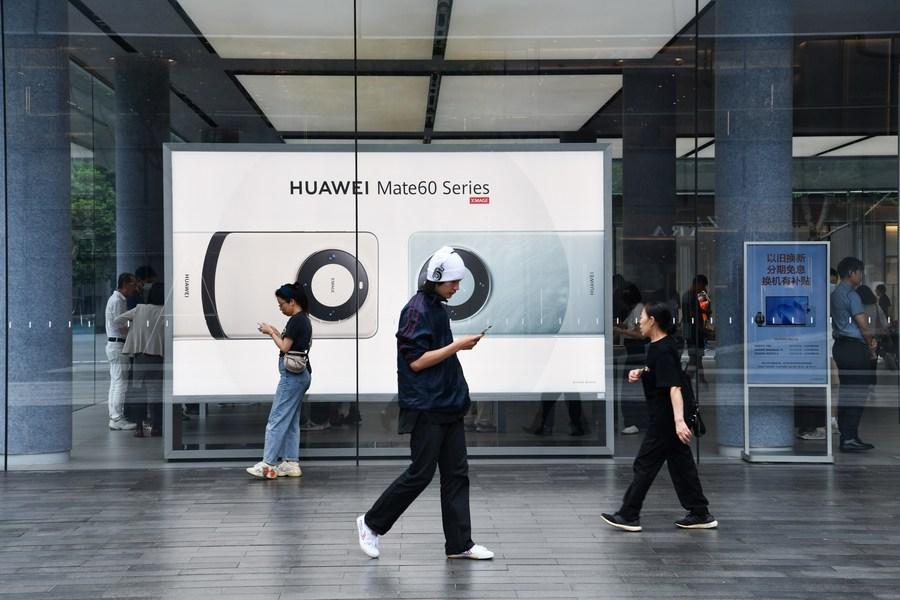Current location:world >>
Huawei's operating system gaining clout
world55People have gathered around
IntroductionPeople walk past a flagship store of Huawei in Shenzhen, south China's Guangdong Province, Sept. ...

People walk past a flagship store of Huawei in Shenzhen, south China's Guangdong Province, Sept. 11, 2023. [Photo/Xinhua]
Huawei Technologies Co announced on Wednesday that more than 800 million devices in China, including its own-branded products as well as devices from third-party companies, have now been equipped with its self-developed operating system Harmony-OS.
The progress showcases Huawei's ambitions to build a robust software ecosystem for hardware, despite the US government's prolonged restrictions on the Chinese tech heavyweight.
Yu Chengdong, chairman of Huawei's consumer business group, which includes smartphones, PCs and other internet of things devices, said 180 types of devices can now be upgraded to HarmonyOS 4.2, the latest version of its in-house operating system, encompassing smartphones, tablets and earphones.
In the automotive sector, Huawei said its new Aito M5, an SUV it developed in collaboration with Chinese automaker Seres, has garnered substantial consumer interest since its April 23 launch, with over 10,000 orders placed within the first 72 hours.
At an online product launch event held on Wednesday, Huawei also unveiled a string of new devices including laptops and tablets, featuring cutting-edge artificial intelligence functions.
The move comes as Huawei surpassed Apple to become the top vendor in the Chinese tablet market in the fourth quarter of 2023, for the first time since 2010, said market research company International Data Corp.
Huawei achieved a market share of 30.8 percent, an increase of 9.6 percentage points year-on-year, while Apple's share declined by 6.7 percentage points to 30.5 percent. Xiaomi, Honor and Lenovo followed in the rankings.
Gan Miao, senior research manager at IDC China, said the overall performance of China's tablet market in 2023 was within market expectations.
As the market transitions from a phase focused on cost-effectiveness, 2024 is expected to see mainstream brands place greater emphasis on user experience and sustainable development. Tech trends in the Chinese tablet industry are projected to focus on enhancing system software capabilities, leveraging AI-generated content technologies and launching more intelligent system-level integrated products, Gan said.
Meanwhile, after 13 quarters, Huawei returned to the top position in the Chinese smartphone market in the January-March period, capturing a 17 percent market share, driven by the success of its Mate and Nova series, said market research firm Canalys.
Xiang Ligang, director-general of the Information Consumption Alliance, a telecom industry association, said: "It was through arduous efforts that Huawei managed to revive its consumer-oriented business, which was once crippled by the US government's restrictions. Huawei's comeback in the smartphone market coincides with good timing, as AI smartphones are expected to trigger a new round of growth."
According to data from the Ministry of Industry and Information Technology, China's top industry regulator, phone production volume in the country reached 374 million units in the first quarter, representing a 13.6 percent year-on-year increase and showcasing a steady recovery trend.
Tags:
Reprint:Friends are welcome to share on the Internet, but please indicate the source of the article when reprinting it.“Global Gateway news portal”。http://philippines.cumberland-sausage.net/news-25c699354.html
Related articles
San Diego FC partners with Club Tijuana for a series of matches
worldSAN DIEGO (AP) — San Diego FC, a Major League Soccer expansion team set to start play in 2025, annou ...
【world】
Read moreIsraeli airstrikes in S. Lebanon kill Hezbollah fighter, injure 2 civilians
worldA Hezbollah fighter was killed and two civilians were injured on Sunday in Israeli airstrikes on the ...
【world】
Read moreXi extends condolences to Putin over deadly Moscow concert hall terror attack
worldChinese President Xi Jinping on Saturday extended condolences to Russian President Vladimir Putin ov ...
【world】
Read more
Popular articles
- Golfer's prompt release from jail rankles some who recall city's police turmoil
- OPEC chief stresses energy cooperation with China
- IMAX announces new venues in China, expresses confidence in market
- Guyanese president arrives in Chengdu for FISU World University Games
- Hezbollah leader vows continuous conflict with Israel to support Gaza
- Palestinian death toll in Gaza rises to 33,482: Ministry
Latest articles
Harrison Butker's controversial speech was 'f***ing horrible' says Benedictine Colelge student
Exhibition unveils rare masterpiece by ancient Chinese artist
Hangzhou 2022 Asian Games lights up passion for Esports
Beijing 2022 flag bearer trains volunteers for 31st FISU University Games
Hezbollah leader vows continuous conflict with Israel to support Gaza
Scientists say coral reefs around the world are experiencing mass bleaching in warming oceans
LINKS
- Baltimore leaders accuse ship's owner and manager of negligence in Key Bridge collapse
- Bill allowing parents to be fined for child's criminal offenses heads to Tennessee governor
- Brit, 22, plunges to his death from fifth
- A cluster of earthquakes shakes Taiwan after a strong one killed 13 earlier this month
- Met officer admits dispersal order 'breached by Tommy Robinson at march against anti
- Defund Columbia: Robert Kraft pulls his money as other donors blast 'f*****g crazy' anti
- An adored ostrich at a Kansas zoo has died after swallowing a staff member's keys
- Does this video show a military convoy in Myanmar’s Rakhine state? — Radio Free Asia
- Venezuela's president meets with accuser in ongoing criminal probe into human rights abuse
- Delta Air Lines, facing another union attempt to organize flight attendants, is raising their pay